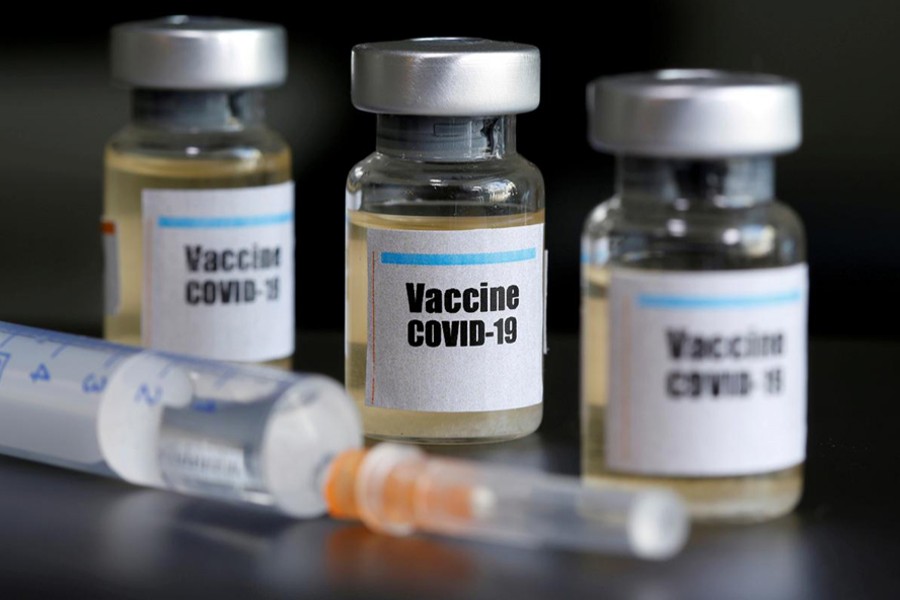Bangladesh will not be able to produce COVID-19 vaccine, when it is developed.
The country is yet to achieve the World Health Organization's (WHO) global benchmarking criteria essential to apply for pre-qualification (PQ) status. The PQ status is a mandatory requirement for developing a vaccine.
The national regulatory authority concerned is yet to be classified as 'Maturity Level Three' of the WHO, although Bangladesh has a strong pharmaceutical sector that exports drugs and medicines to at least 150 countries.
Following a recent query by the FE, the WHO country office in Bangladesh mentioned that this classification is mandatory to apply for developing a vaccine, as vaccine development is a very complex and regulated process.
However, officials of the Directorate General of Health Services (DGHS) and local pharmaceuticals companies said Bangladesh has the capacity to produce vaccine, if 'fill-finish' Active Pharmaceutical Ingredients (API) are made available by the COVID-19 vaccine-producing countries.
Two of the pharmaceuticals in Bangladesh - Popular and Incepta - have their separate vaccine units. Of these, only Incepta Pharmaceuticals Limited has a large plant with state-of-the-art facilities.
A senior official of DGHS, also a former expert of WHO, said the country needs to maintain constant communication with the global health actors for getting speedy access to COVID-19 vaccine, after it is developed.
He acknowledged that the requirements of WHO are yet to fulfilled, as the government always gave less priority to the development of research facilities in the health sector.
As a result, the pharmaceutical companies in other countries may grab the global market share, sidelining the Bangladeshi companies in some cases.
Expert manpower, proper lab facility and some other issues are important for being eligible for vaccine development, he added.
Muhammad Habibur Rahman, DGM marketing of Incepta Pharmaceuticals Limited, said the company has been producing around 12 vaccines so far in its own plant.
However, most of the vaccines are manufactured with imported API, except vaccines for cholera and meningitis.
By next year, the company will be able to produce its own API for Hepatitis B and Rabbis.
"We have the capacity to produce COVID-19 vaccine, if 'fill-finish' API is made available."
Incepta will be able to produce 25 million doses of vaccine per month, he also said.
Mentioning the recent disclosure of a Chinese company - Sinovac, he said Incepta has close links with the company, as it imports API for flu vaccine from it.
After recent two-stage trial, researchers of this Beijing-based biotech company said they are 99 per cent sure that their COVID-19 vaccine would be effective.
"We are in an advantageous position in producing vaccines, as many of the countries, including Sri Lanka, Nepal and Pakistan, do not have their own vaccine plants," the Incepta DGM said.
He opined that the national regulatory authority will have to develop capacity to examine vaccines, manufactured by the local pharmaceutical companies, to get approval from the WHO.
"For our existing vaccines, we have obtained permission from the WHO's pre-qualified laboratories, located in India and Thailand, as our national authority is yet to meet the WHO criteria."
Once successful trial of COVID-19 vaccine is done, Incepta has the capacity and logistics to produce the vaccine within one month after getting 'fill-finish' API, Mr Rahman claimed.
He urged the government to maintain constant communication with the countries that have already started developing vaccine for coronavirus.
Additional Secretary of the Ministry of Health and Family Welfare Md Habibur Rahman said the government is keeping close eye on the vaccine development moves by global health actors.
He said that the pharmaceutical sector in Bangladesh is strong enough, but the government should have invested more on research and development (R&D) activities in health sector for its capacity building to produce vaccines.
"Once the vaccines are developed, we would place our demand for getting equal access," he added.
In an email response to the FE, theWHO said it has launched the access to COVID-19 tools (ACT) accelerator together with the global health actors and partners to accelerate the process for development, production and equitable access to new COVID-19 diagnostics, therapeutics and vaccines.
"WHO and Costa Rica announced a new global technology pooling initiative to make COVID-19 vaccines, medicines and other health technologies accessible and available worldwide."
Over 110 vaccines are in the process of development globally, including eight in clinical evaluation, and several therapeutics in clinical trial, it further said.
"WHO is committed to ensuring that as medicines and vaccines are developed, they are shared equitably with all countries and people."
Currently, Bangladesh enjoys an exemption from the Trade-Related Aspects of Intellectual Property Rights (TRIPS) waiver under World Trade Organisation (WTO) rules, which will continue until 2032.
"This allows the opportunity to expedite the production of new medical products, without requiring permission of a patent holder."
"This is a valuable tool for public health, as in many countries of the world access to medical products may be delayed or price increased due to intellectual property considerations and trade barriers," WHO added.


